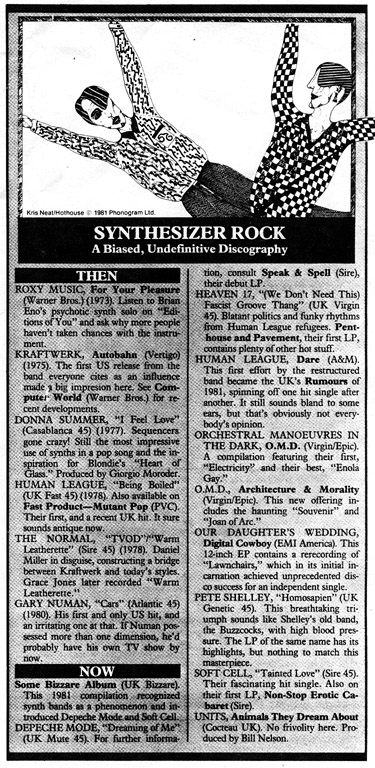p. 22-27
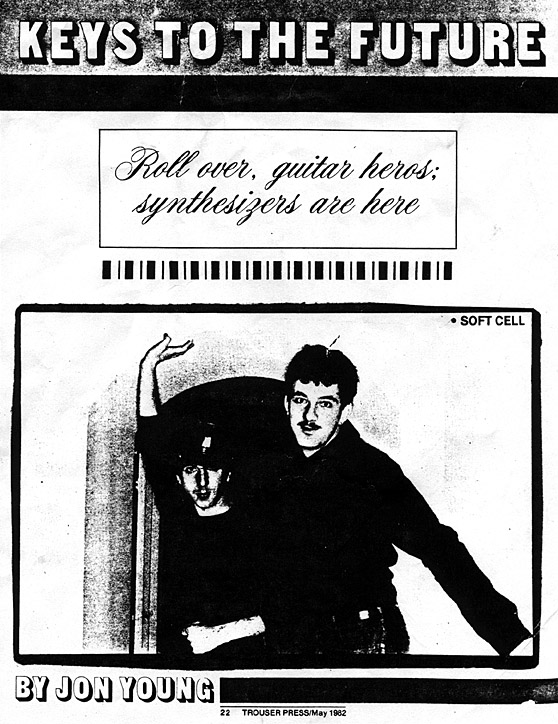
|
''Not a day goes by when you don't press a button, whether it's for a cup of coffee or to turn on the stereo or video. People are so surrounded now by electronics, of course there's electronic music. "
-David Ball of Soft Cell
When Devo first sputtered onto the scene in 1978 they were fond of announcing in interviews that eventually they would give up guitars and switch over to synthesizers exclusively. Devo's provocative, revolutionary idea, however, was already accepted in England: the Human League, Gary Numan, Orchestral Manúuvres in the Dark and other daring souls had begun mounting projects that would disregard the guitar's long dominance in rock in favor of a box of wires that made strange sounds. Of course, the synthesizer wasn't invented in 1978 to amuse Gary Numan. Throughout the '70s the instrument slowly infiltrated pop music as knowledge of its unique qualities spread. Such major creative forces as Todd Rundgren, Stevie Wonder and Brian Eno (with and without Roxy Music) successfully integrated synth into their songs and encouraged others to do the same-and Krafrwerk's whimsical robotics and Tangerine Dream's ethereal oozings were available long before the emergence of Britain's latest chart sensations. But today everyone from Abba to Public Image Ltd. uses synthesizers as a matter of course. So what actually did change? One very significant thing. Pure, unadulterated synthesizer sound now appears on (more or less) conventional pop tunes. The instrument doesn't call attention to itself, as it had with Kraftwerk and their ilk; machine and song now meet on equal terms. In Britain, at least, the public has signaled its approval. Current UK charts are studded with synthesizer bands like Soft Cell, Human League and Orchestral Manoeuvres in the Dark, as well as groups heavily dependent on the instrument, such as Ultravox (the link between Roxy Music and Gary Numan). What is a synthesizer, anyway? Guitars, drums and so forth are easy to comprehend, but these newfangled contraptions seem forbiddingly alien. Never fear, Scott Simon of Our Daughter's Wedding, a New York City trio that is one of the American alternatives to UK synth bands, offers a layman's explanation of how the thing works. |
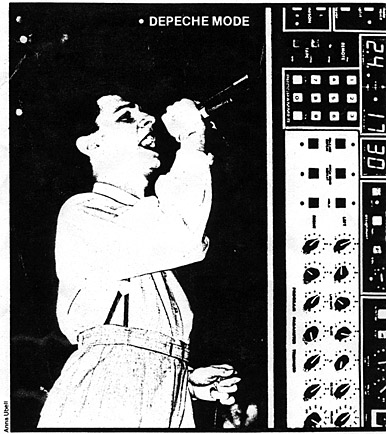
TROUSER PRESS/May 1982 23 |
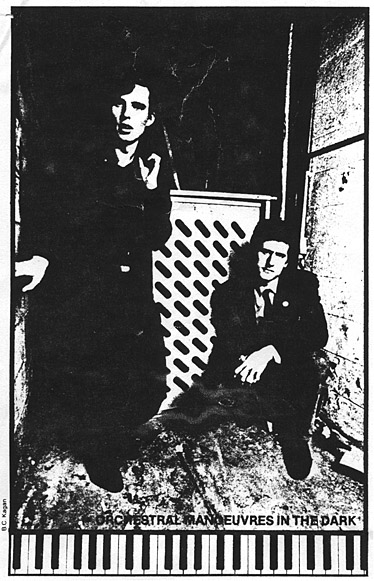
|
you don't need technical ability, you need ideas and the ability to write
songs. That's the main thing." Easy access to synthesizers has given them a bad image as a stale, monotonous instrument. Since practically anybody con play one, a lot of dullards have gotten involved. Andy Fletcher observes that "because you can get such good sounds on the synth you can get away with murder. You can have an awful song and make it sound quite good. Quite a lot of bands do that." Some "sophisticated'' musicians also don't understand how their own equipment works. "We're not Kraftwerk, '' Andy Fletcher says, acknowledging the obvious. "Kraftwerk built their own computers and keyboards." Dave Gahan adds, "If someone gave us a computer and said, 'Use that,' we wouldn't know what to do with it.'' Andy McCluskey laughs at the situation. "We and a lot of other bands who use synths have this technological image that few bands actually deseve. For Kraft- werk, it's a total ideology; it's the way they work. The fact that they use synths is important to them. But as for a lot of new English bands-we don't understand how the hell the things work! Paul [Humphreys] did study electronics, so he knew the principles behind it, but I had to learn by hit and miss." Those not deterred (or bothered) by electronic complexity and other attractions in addition to the synthesizer's pleasing sound and ready availability. Small, cheap synthesizers used by a beginning band are invariably more mobile than the guitars and cumbersome amplifiers necessary for even the most rudimentary rock bands. (A synthesizer can be plugged directly into the house p.a.) Our Daughter's Wedding boasts that at first their synths were carry-on luggage on airplanes. Depeche Mode's Dave Gahan says the logistics of getting to London gigs from their home town of Basildon 25 miles away was a determining factor in their switch from guitars to synths. Andy Fletcher adds "Until about six months ago we used to go to and from gigs by train. The audience would see us play and they'd see us on the train afterward with our instruments!'' The band also raves about how easy it is to conduct a pre-show soundcheck. Once Depeche Mode's three players tune their instruments to a synthetic drum tape it's all systems go. Andy Fletcher says the precess usually lakes no more than an hour. By comparison, he notes, ''When we TROUSER
PRESS/May 1982 24
|
| supported Ultravox
at the Rainbow, they were soundchecking for about five hours." "I couldn't stand being in that sort of group." Soft Cell's David Ball cringes at the thought of playing in a "traditional" rock band. The instrumental half of Soft Cell (Mark Almond furnishes vocals) usually needs no more than an hour to get ready for a show. Both Depeche Mode and Our Daughters Wedding held early practice sessions in small suburban bedrooms. Since they didn't need amps, it was a simple matter to plug headphones directly into the synth and commence creating. (And no nasty noises to annoy Mom!) By the same token, Depeche Mode doesn't even use the big room in a recording studio; the band just plugs directly into the control room con- sole. How's that for simple? All well and good, you say, but what about the sound of synthesizers? Anyone who's been exposed to Gary Numan's whiny drone [Singing or playing? -Ed.] for more than three minutes may well conclude the synthesizer is an evil menace to rock, designed to eviscerate all feeling. Rachel Webber, who shares the Units' synthesizer duties with Scott Ryser, probably speaks for the wary American public when she voices reservations about the cur- rent crop of British synth bands. "In general-'cause I like Orchestral Manoeuvres -those bands can get pretty similar. I don't like the Gary Numan type of scene." Scott Ryser adds, "It doesn't seem like there's much depth to it. I like it for dancing, but it's hard to take very seriously. '' Webber feels a lot of groups "just get a basic sound they know will work. Those cute little squiggles do work, as far as what people like, but it's not very challenging." Don't blame the poor old inanimate synthesizer for appearing on a lot of boring records. Blame the musicians. Layne Rico of Our Daughter's Wedding obsesses, "A lot of people are against synthesizers and say, 'All you have to do is press a button'- which in a way is quite true. It's all down to how each individual plays the instrument.'' Bandmate Keith Silva adds, "Some people use only what's easy to get out of it, but if you search there's a lot you can do." The "new romantic" movement, with its watery dress-up ideology and simplistic dance motifs, has probably done a lot recently to give synths a bad name. Tedious stuff is being ground out with the aid of synthesizers-but what else is new? There are plenty of mediocre guitarists too. Andy McCluskey recognizes the dangers. "Over the last 20 years or so kids who've wanted to be musicians have decided, 'I've gotta be a guitar player. I wanna be an axe hero.' They'd adopted what were new ways of playing at the time, |
|
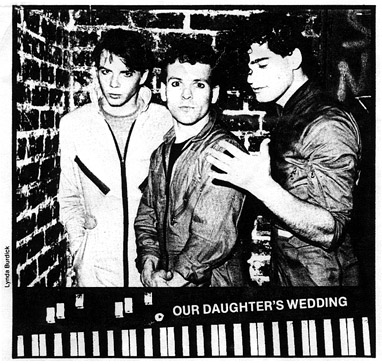
|
machine,
and various sequencer bits. On their five-song EP, Digital Cowboy, Our daughter's Wedding used ace drummer Simon Phillips instead of a rhythm box. Onstage Layne Rico augments the mechanical beat with a Synare synth, which can produce either percussive or melodic tones. The Units recently enlisted a percussionist and a drummer. On Architecture & Morality Orchestral Manúuvres combine acoustic and synthetic drums for a hybrid sound. Soft Cell and producer Mike Thorne concocted an intriguing approach for Non- Stop Erotic Cabaret. As David Ball reveals, "We took the output of an electronic snare and put it through a little speaker, which we laid face down on top of a snare drum; then we miked that up. So we were getting a real snare sound, but it was triggered by a drum machine. I think it gives a slightly richer sound." There's no reason for any two synthesizer bands to sound alike if they've got talent and aren't too rigid in their outlook. Paul Humphreys believes synths are "the most versatile instrument-but there are things you can't do on a synthesizer, like get the power and rawness of strumming a guitar.' That's why Architecture & Morality features OMD'S first use of guilar, as well as horns, piano and saxes. "Very often the mainstay of a song is not synthesizers but sound ideas in general,' Andy McCluskey observes. OMD'S recent single "Joan of Arc'' employs a glockenspiel which gives it springiness, and I did two different vocal lakes. One has all these little voices- I'm trying to follow a synthesizer I'd set on D. On the other one I sing high-pitched, almost falsetto harmonies.'' "Souvenir'' resulted from equally ingenious procedures. Humphreys took tapes of an eight-member church choir singing scales and made up the tape loops that give the song its wobbly, shifting quality. In other words, smile when you call Orchestral Manoeuvres a synth band. "They're not our number one priority," McCluskey states. "We're not on some electronic crusade; we're not interested in the synthesizer as an image. We have a load of them onstage because that's what we play. We just use them as a means to an end. '' A close look reveals that, in one sense, most of these bands aren't all that different from traditional rock groups. Our Daughter's Wedding, the Units and Depeche Mode all dole out responsibilities for melody, bass and percussion to different members, just like the good old days. In most cases the material could be rearranged to accomodate implements of yore like guitars and drums. Our Daughter's Wedding recalls Sparks. Orchestral Manoeuvres sometimes suggests a smarter Beach Boys. Soft Cell's TROUSER PRESS/May 1982 26 |
| massive
UK smash "Tainted Love'' was originally an obscure '60s soul recording
by Gloria Jones. "We've just worked up a James Brown tune ['It's a Man's, Man's, Man's World'] so I guess a guitar band could work one of ours up," the Units' Ryser says. (He originally wanted the Units to be "real brash and hard, the Iggy Pop of synthesizers.'') David Ball would like to hear an orchestra tackle one of Soft Cell's songs. Keith Silva even get so far as to label Our Daughter's Wedding a rock band: "We're all keyboards but we still feel we're a rock band. It lakes people a while to figure out, 'Hey, these guys just play good music and it rocks.' '' Layne Rico adds that "'Lawnchairs' or 'Target for Life' could be done by Van Halen or any other band. "It's just music." If you were looking forward to a bloody shoot-out in the charts between guitars and synths forget it. "There's room for everything," David Ball remarks. "synthesizers are just another option. If people want to play guitars, that's great. You should be able to play any instrument you like." Rachel Webber says, "There's supposed to be this big rivalry between synthesizers and guitars, which I think is pretty weird. I don't think people are sick of guitars, I just think they're looking for something different. If anything, guitars have gotten stronger." The search for alternative means of expression |
may
eventually lure synth bands into trying out guitars. Depeche Mode has
already considered such a move. "I think the guitar is a beautiful instrument," Layne Rico of Our Daughter's Wedding says. "When everybody thinks we're going to electronic, we might do a big circle and come onstage with guitars." Made possible by the onward march of science, synthesizers and synthesizer bands will continue to change with the technology. Layne Rico is anxiously awaiting a set of hexagonal electronic drums. "They're made of the same material as football players' helmets. Playing them is like hitting a drumstick against a barstool. These drums are only about two inches deep; they look like hexagonal pie pans. We'll finally be able to break away from the rhythm machines a bit." On a less sophisticated front, basic synthesizers have dropped in price so much that anyone with $200 can become at least a fledgling artiste. Soon a generation that grew up on Gary Numan and the Human League, rather than the Stones and Led Zeppelin, will be ready to enter the musical job market . Andy Fletcher knows seven- and eight- year-olds who can play melodic lines on the synth; tomorrow's musicians will test the instrument's capabilities without treating it as a futuristic aberration. Sooner or |
later
a bona fide synthesizer genius steeped in the early electronic bands may
come along and revolutionize the field, just as Jimi Hendrix absorbed
the blues and early rock guitar styles before emerging as staggeringly
original. David Ball has no doubts that synthesizers have arrived. "When electric guitars were first used I'm sure people were saying, 'Do you really think this is gonna last?' Electric guitars have been with us for years now, and I think it will be the same with synths. People have accepted it as a conventional instrument rather than a freak of science.'' "I think synthesizers are here to stay," Daniel Miller sums up, "regardless of what they're playing now. A lot of things I thought were gonna happen a few years ago have happened." England has a basis for synthesizer music. I don't think it's a fad, because it's lasted. Since Gary Numan there's always been synthesizer music in the English charts. It's gone through all the different fashions and it's still there. "The synthesizer's such a flexible instrument. You can play anything on it. It's not a kind of music; it's a way of making music." Synthesizers now have the potential to become the next classic rock 'n' roll instrument. Keep your ears open. Who knows-in a few years the sequel to this piece may even star you! TROUSER PRESS/May 1982 27 |
